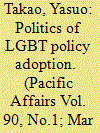| Srl | Item |
| 1 |
ID:
152072


|
|
|
|
|
| Summary/Abstract |
This article will examine the determinants of LGBT (lesbian, gay, bisexual, and transgender) policy adoption in Shibuya, one of the twenty-three city wards of Tokyo, by taking an actor-specific approach to the first case of officially recognized same-sex partnership in Japan. How did the sexual minority issue become the subject of official agendas? How did actors both inside and outside the municipal government seize agenda-setting opportunities for government action? The results indicate that key policy makers’ entrepreneurship played a primary role in the official recognition of same-sex partnership by linking policy solutions with agenda-setting opportunities. This analysis demonstrates that the adoption of municipal LGBT policy does not necessarily reflect the redistribution of non-material resources, such as citizen values, but rather resembles the patterns of welfare politics.
|
|
|
|
|
|
|
|
|
|
|
|
|
|
|
|
| 2 |
ID:
133833


|
|
|
|
|
| Publication |
2014.
|
| Summary/Abstract |
This article examines the multi-layered continuities of violence experienced, navigated and narrated by those in the Great Lakes region from the perspective of one life. Drawing on the unfolding life stories of Alex, a sexual minority refugee in Uganda, it focuses upon the complex predicament of persecution and marginalisation of the region's sexual minorities, as they navigate protracted political conflict, displacement and wider intersecting forms and sources of violence. This article aims to draw attention back to the lived realities of violence as they are interpreted and articulated through time and space in situated acts of speaking. An ethnographic life stories approach compels us to consider the agency of those who navigate complex constellations of intersecting and multiple forms of violence woven through the fabric of everyday life, the social topographies within which people navigate and the wider sociocultural, political and legal dimensions within which they live.
|
|
|
|
|
|
|
|
|
|
|
|
|
|
|
|